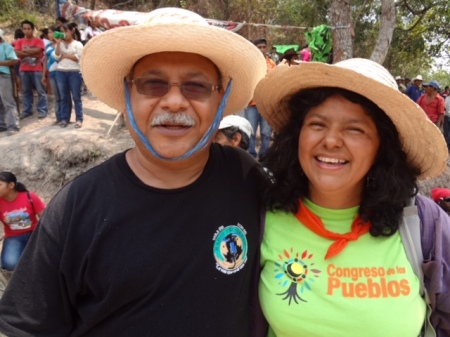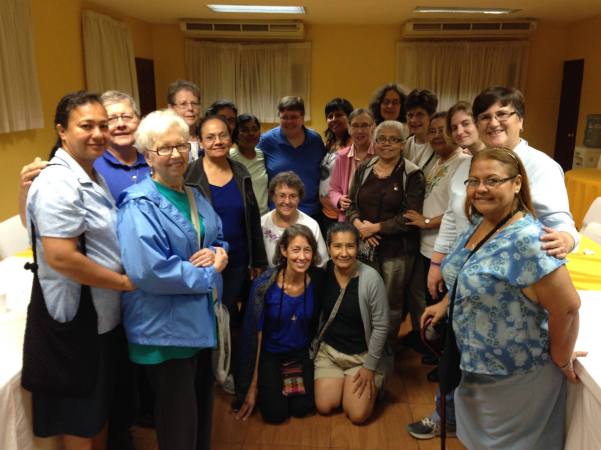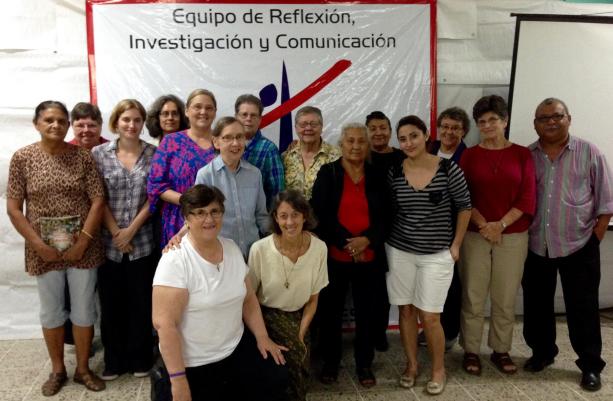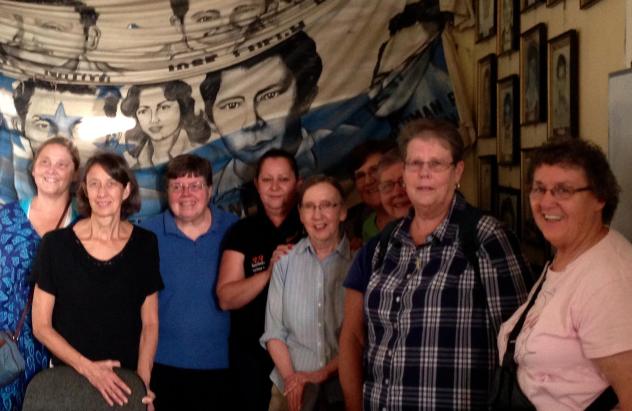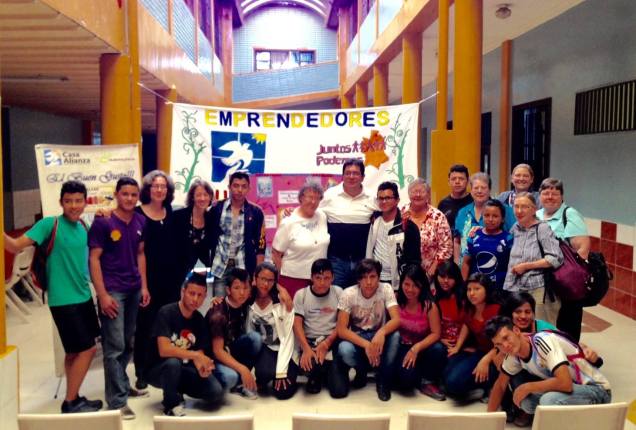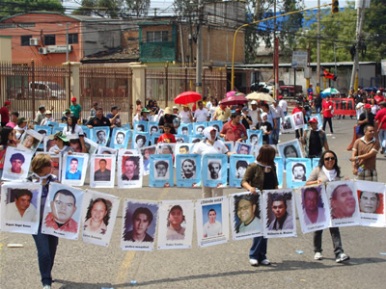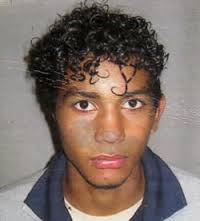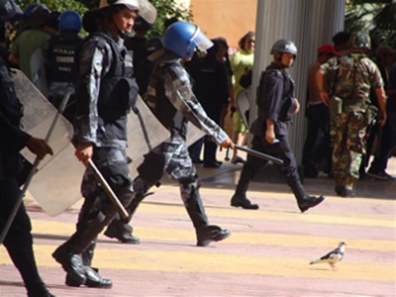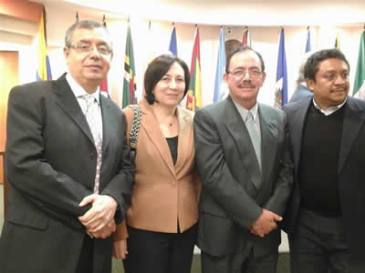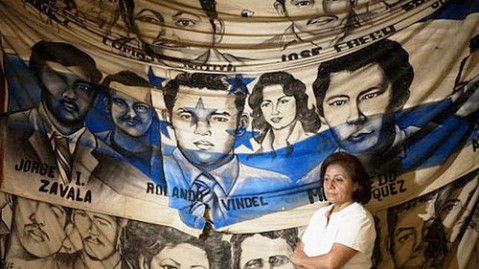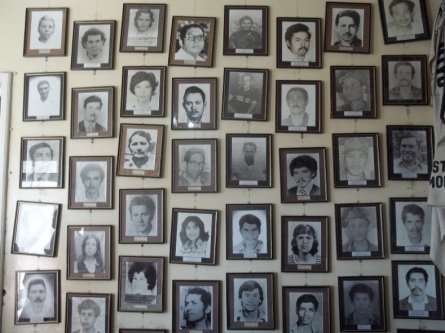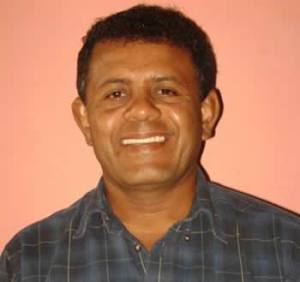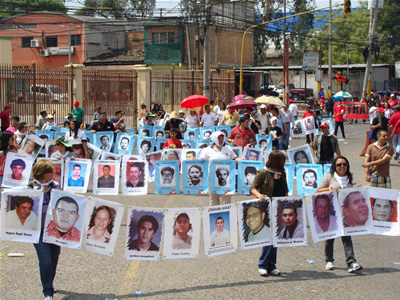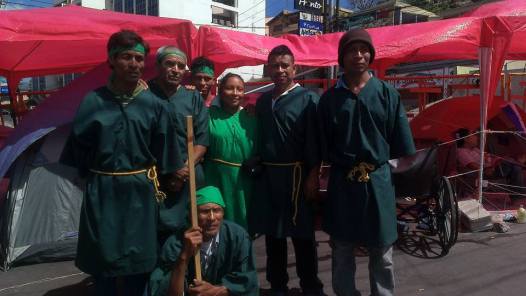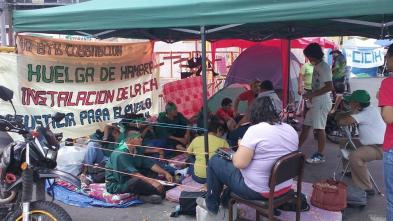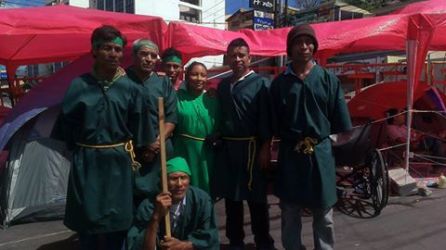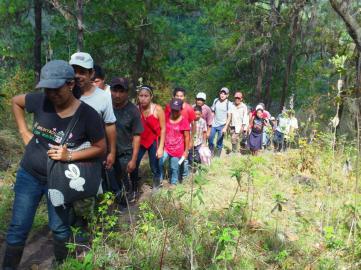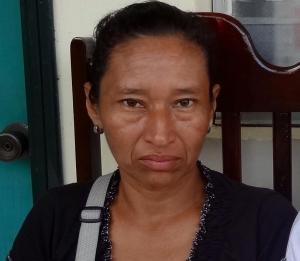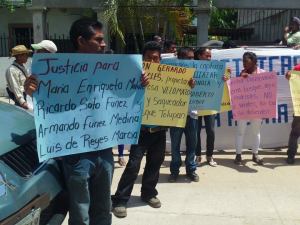The undersigned organizations, express our deep concern about the serious incidents that occurred on Friday, April 15 in the town of San Francisco de Ojuera -Department of Santa Barbara where a dozen people were injured.
On Friday April 15, 2016, approximately 400 people, members of Honduran and international human rights organisations, social movements and the media, travelled to the Gualcarque River as part of a caravan to commemorate the murder of Berta Cáceres, the international meeting was known as “Berta Cáceres lives”. The signatory organisations were present at the meeting and observed patterns of attacks against international and national organisations that are replicated in other regions of the country and have originated from deep social conflict.1
Below we describe the events witnessed:
– Around 2 pm, the peaceful caravan arrived at the community of San Ramon, municipality of San Francisco de Ojuera. Participants at the front of the commemorative march were confronted by a group of about 30 people who expressed their support for the Agua Zarca hydroelectric project implemented by the company Desarrollo Energéticos S.A. (DESA). They carried placards with inscriptions supporting the hydroelectric project and against the Civic Council of Popular and Indigenous Organizations of Honduras (COPINH), brandishing machetes and issuing serious threats against COPINH and other participants in the international meeting. Despite the significant presence of police and army along the entire route of the international caravan, there were just six police officers positioned in front of the group.”
– The caravan continued its journey to the banks of the River Gualcarque where a spiritual ceremony was held in memory of Berta Cáceres.
– At approximately 5 pm, the caravan ended and a few metres before reaching the buses for their return transport, the same group of people appeared; shouting, insulting, threatening and wielding their machetes. Unexpectedly these people started throwing stones at people who were walking towards the buses. This created panic as people had to run several metres to protect themselves. As a result of this incident, a dozen people in the caravan were wounded after being hit by stones, and at least two people were beaten by the group of people. The attackers also issued death threats to members of COPINH, particularly its new general coordinator Tomas Gomez. Amongst the people who were assaulted and injured were people who are beneficiaries of precautionary measures, including several members of the general coordination of COPINH.2
– Faced with the violence that broke out, the National Police did not react immediately, only intervening after several people in the caravan insistently requested it. We are concerned that the Honduran authorities did not ensure the safety of those present and did not take immediate action against the attacks.
These events have occurred in the context of repeated complaints against the DESA company. These complaints hold the company responsible for the murder of Berta Cáceres as well as for multiple threats and attacks against members of communities and COPINH because of their opposition to the Agua Zarca dam. In light of these developments, we express our serious concern about the situation of extreme vulnerability for organisations, communities and human rights defenders in Honduras, and in particular members of COPINH. The organisations below reiterate our support to requests from Berta Cáceres’ family and members of COPINH, urging the Honduran government to sign an agreement with the Inter-American Commission on Human Rights (IACHR), creating a committee of independent experts to investigate the murder of Berta Cáceres and other cases of human rights defenders who have been killed in Honduras, despite having been granted precautionary measures from the IACHR.
In this context characterised by the closure of spaces for human rights defenders, we are also concerned that situations like the one above make difficult international accompaniment and observation to help protect spaces for non-violent conflict resolution and the promotion and defence of human rights in Honduras. The work of international accompaniers and observers in the country responds to requests from organisations and civil society who have the right to defend their rights, and to seek support and international observation when faced with threats and attacks.
Taking into account the views expressed above and the responsibility of States to ensure the protection, respect and fulfilment of international human rights law, we call upon the international community to undertake the following actions to put a stop to and prevent this escalation of violence against the defence of human rights:
• Issue a statement to the President of the Republic, Commissioner for Human Rights and the Ministry of Justice, Interior and Human Rights:
◦ Expressing appreciation and support for the work of national and international organisations participating in the caravan on 15 April.
◦ Showing concern at the situation described above and the lack of immediate reaction by the authorities present to the reported violence.
◦ Reminding the Honduran State of its obligation to protect human rights defenders, and emphasising the importance of the work they carry out in Honduras. It is also important to highlight the importance of the work carried out by international observers and accompaniment organisations when their presence is requested due to threats and attacks.
• In particular, we call on the Diplomatic Corps and Ministries of Foreign Affairs and / or Aid Agencies to ask for the competent institutions to clarify the events reported, urging a prompt, impartial and thorough investigation into the attacks and threats made by the aggressors and into the actions of the national police.
• Express publicly, through the appropriate channels, support for the work of human rights defenders in Honduras and their right to receive support from international organisations and other organisations.
“Human rights and fundamental freedoms are the birthright of all human beings; their protection and promotion is the first responsibility of governments”3
Organizations:
– International Federation for Human Rights (FIDH), in the framework of the Observatory for the Protection of Human Rights Defenders
– Front Line Defenders
– Honduras Solidarity Network in North America (Honduras Solidarity Network in North America)
– Hondurasdelegation (Germany / Austria)
– Ecumenical Office for Peace and Justice (Germany)
– World Organisation against Torture (OMCT), in the framework of the Observatory for the Protection of Human Rights Defenders.
– Peace Brigades International (PBI Honduras)
– The International Platform against Impunity (Plataforma Internacional contra la Impunidad.)
– PROAH (Proyecto de Acompañamiento internacional en Honduras)
– Protection International
– Witness for Peace (Acción Permanente por la Paz)
1. Two days after these incidents, 17 April 2016, the Canada-Honduras Delegation for Justice, Land and Life went to the opencast gold mine San Andres in La Union, Copan. As the Canadian delegation approached the city of Azacualpa, a group of about 180 mine workers – some armed with machetes, sticks and stones – blocked the street. The delegation reported that the police were present but initially failed to act. The delegation was later notified that they could travel safely to the community and the police managed to disperse the crowd. Mining Watch and other NGOs from the delegation, however, have expressed serious concern about this kind of intimidation.
2. Members of the coordination of COPINH are beneficiaries of IACHR precautionary measures 112-16 of 03.05.2016.
3.Adopted by the UN World Conference on Human Rights (157/93)
